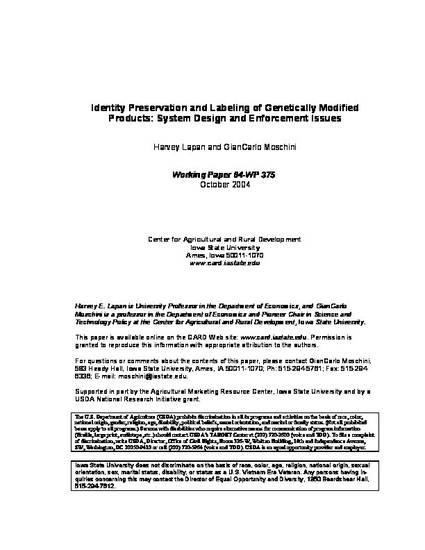
Article
Identity Preservation and Labeling of Genetically Modified Products: System Design and Enforcement Issues
CARD Working Papers
Publication Date
10-1-2004
Series Number
04-WP 375
Abstract
his paper analyzes economic issues that arise in devising a credible and enforceable system of identity preservation and labeling for genetically modified (GM) and non-GM products. The model represents three stages in the supply chain: farm production, marketing handlers, and final users. The possibility of accidental co-mingling of non-GM products is modeled at the marketing stage. Regulation takes the form of a threshold level of purity for non-GM products, a probability of government testing to verify compliance with the threshold level, and a fine for violators. Uncertainty is modeled explicitly, such that would-be suppliers of non-GM products always face some risk of failing the test and incurring a fine. The paper also presents a novel demand specification for differentiated GM and non-GM products that is particularly useful in our stochastic framework. The results emphasize the role and impact of an uncertain testing technology, a critical feature in this setting. We also highlight the somewhat nonstandard trade-off between frequency of testing and the size of the fine that applies here. Because testing can prevent mislabeled product from reaching the consumer, it can provide a direct welfare benefit. An equilibrium that includes production of the non-GM good may only be supportable with sufficiently high testing frequency (a high penalty for mislabeling may not suffice).
Disciplines
Citation Information
Harevy E. Lapan and GianCarlo Moschini. "Identity Preservation and Labeling of Genetically Modified Products: System Design and Enforcement Issues" (2004) Available at: http://works.bepress.com/giancarlo-moschini/23/
